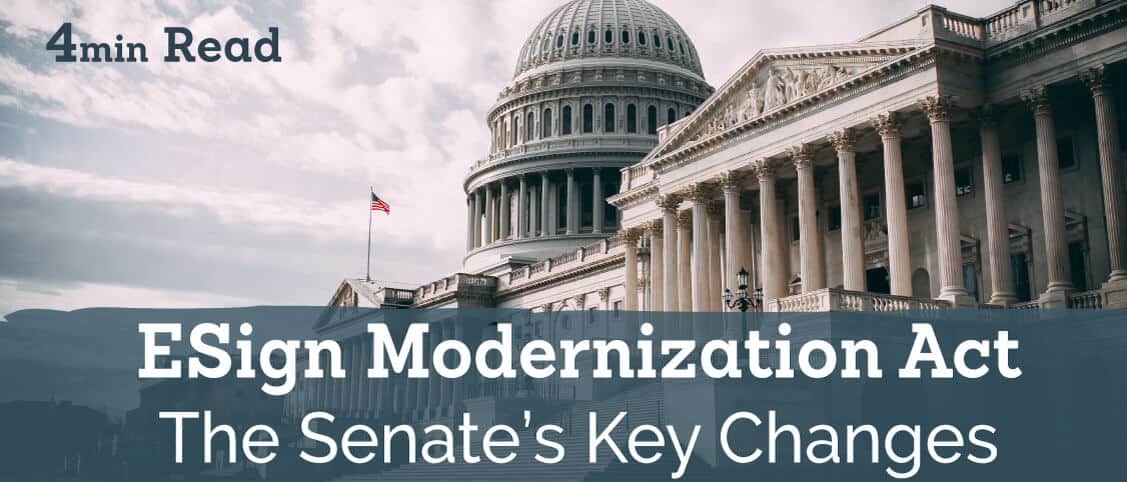The Senate’s Key Changes to the eSign Act

Published:
The Senate’s Key Changes to the eSign Act
We’re all tired of hearing ‘because of Lockdown, things are changing’, but in the electronic signature legislation world, things really are changing.
The ESign act and UETA governs the use of electronic signatures in the US. The ESign Act is currently known as a federal law that a document cannot be denied legal effect simply because it’s in electronic form.
For our detailed guide of the ESign act see here or watch the video below.
Current ESign & UETA Acts broken down:
E-SIGN Act 2020 Modernization
The bill to advance the ‘E-SIGN Modernization Act’ has had a huge amount of support from The Senate Committee on Commerce, Science, and Transportation. The bill itself outlines ways of easing the process for consumers receiving electronic documents and communications.
“The E-SIGN Act in its current form makes it more difficult to communicate with consumers. Limiting consumers’ ability to receive the information they need electronically is not a helpful step toward protecting consumers.” – ACA International
The Senate committee voted on the bill on the 16th of September, and have passed it, but the bill is awaiting approval by the full Senate.
In full, the bill would mean that consumers are able to be sent and sign documents electronically, as long as simple disclosure information and consent to receive electronic documents.
Instead of the older, outdated outline of the E-Sign Act, that requires the consumer to demonstrate that they can access electronic documents before they can receive an electronic version.
“This legislation would be an important step toward addressing some of those concerns with the outdated nature of the E-SIGN act.” – ACA International
These proposed changes to the ESign Act is just one example of how the laws are changing in the US to accommodate the struggles of Lockdown.
Changes to IRS forms
Once again in reaction to the current situation and remote working, IRS has temporarily approved a selection of IRS tax forms that can now be electronically signed if submitted before 31st Dec 2020. IRS electronic signature laws are constantly changing so we will update you when we inevitably see more change.
- Form 3115, Application for Change in Accounting Method;
- Form 8832, Entity Classification Election;
- Form 8802, Application for U.S. Residency Certification;
- Form 1066, U.S. Income Tax Return for Real Estate Mortgage Investment Conduit;
- Form 1120-RIC, U.S. Income Tax Return For Regulated Investment Companies;
- Form 1120-C, U.S. Income Tax Return for Cooperative Associations;
- Form 1120-REIT, U.S. Income Tax Return for Real Estate Investment Trusts;
- Form 1120-L, U.S. Life Insurance Company Income Tax Return;
- Form 1120-PC, U.S. Property and Casualty Insurance Company Income Tax Return; and
- Form 8453 series, Form 8878 series, and Form 8879 series regarding IRS e-file Signature Authorization Forms.
They will be reviewing throughout the year to determine if these laws will be kept once we move back to ‘normal business’.
“We understand the importance of digital signatures to the tax community, and we will continue to review our processes to determine where long-term actions can help reduce burden for the tax community” – IRS Commissioner, Chuck Rettig
